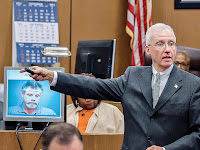 |
| Defense lawyer Michael McCarthy |
So it was appellate "business-as-usual" when Bob Bashara, jury-convicted last year of the sensational first degree murder of his wife, raised the issue effective assistance post-verdict. His MAACS attorney, Ron Ambrose, had to raise this standard issue in order to perfect Bashara's appeal.
Whether a convicted defendant has received the effective assistance of counsel is developed through a hearing known as a Ginther hearing. The object of a Ginther hearing is to determine whether his legal representation fell below what court's have deemed constitutionally effective legal representation.
The hearing, conducted in the Frank Murphy Hall of Justice, provided a rare insight into what goes no behind the scenes with the lawyers in the accused's camp.
Our good friend, Michael McCarthy, along with Detroit lawyer Lillian Diallo, constituted Bashara's high-powered, albeit court-appointed, defense team. In order to determine whether a defendant received the effective assistance of counsel during a felony trial, testimony is taken by defendant's trial lawyer(s). Both the defendant's appellate counsel and the prosecutor get to question the defense lawyers.
Bashara alleged the assistance he received during his trial was ineffective because his lawyers refused to call certain witnesses and did not run the case the way he wanted it run. He wanted the lawyers to call witnesses who could discuss the seedy alternative lifestyle in which Bashara was involved: bondage, discipline, sadomasochism or BDSM.
For their part, the lawyers were not having it; they refused to put on such a case in Bashara's defense. Diallo testified at the hearing she was not about to become Bashara's legal slave and that he always acted like he was the smartest person in the room. McCarthy refused to develop a develop a defense around the Bashara's sexual limitations because he did not want to drag Jane Bashara's name through the proverbial mud.
In this case, given its high-profile nature, we have been treated to the frank testimony of the defense duo; a rare behind-the-curtain look at defense trial strategy in a high-profile media case. It has been our experience that an accused often wants things to go a certain way. Without an understanding of the law, evidence and procedure, that client is often sorely disappointed by the manner in which the case is presented to the jury.
The trail judge will not likely be ordering a new trail for Bashara; this exercise is simply to develop a record for the Court of Appeals to consider.








